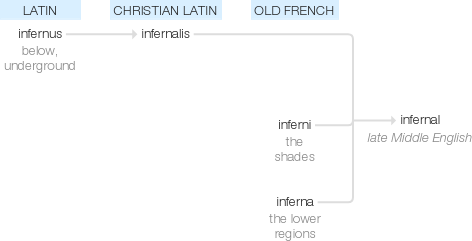Infernal
late Middle English: from Old French, from Christian Latin infernalis, from Latin infernus ‘below, underground’, used by Christians to mean ‘hell’, on the pattern of inferni (masculine plural) ‘the shades’ and inferna (neuter plural) ‘the lower regions’.
wiktionary
From Middle French infernal, from Medieval Latin infernalis, from Latin īnfernus, from īnferum(“netherworld, underworld, hell”).
etymonline
infernal (adj.)
late 14c., "of or pertaining to the underworld," (ancient Tartarus, the sunless abode of the dead, or the Christian Hell), from Old French enfernal, infernal "of Hell, hellish" (12c.), from Late Latin infernalis "of or belonging to the lower regions," from infernus "hell" (Ambrose), in classical Latin "the lower (world)," noun use of infernus "lower, lying beneath, underground, of the lower regions," from infra "below" (see infra-).
Pluto was infernus rex, and Latin inferi meant "the inhabitants of the infernal regions, the dead." Association of the word with fire and heat is via the Christian conception of Hell. Meaning "devilish, hateful" is from early 15c.; meaning "suitable for or appropriate to Hell" is from c. 1600. As a name of Hell, or a word for things which resemble it, the Italian form inferno has been used in English since 1834, via Dante. Related: Infernally.
